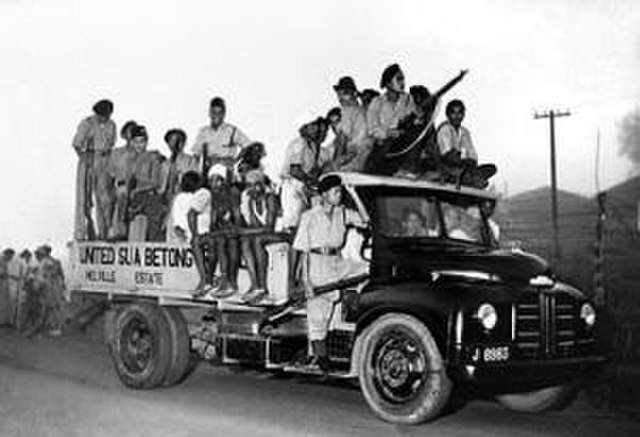Malayan National Liberation Army
The Malayan National Liberation Army (MNLA), often mistranslated as the Tentera Pembebasan Kebangsaan Malaya, was a communist guerrilla army that fought for Malayan independence from the British Empire during the Malayan Emergency (1948–1960) and later fought against the Malaysian government in the Communist insurgency in Malaysia (1968–1989). Their central committee was a trade union activist known as Chin Peng who had previously been awarded an OBE by the British for waging a guerrilla war against the Japanese occupation of Malaya. Many MNLA fighters were former members of the Malayan Peoples' Anti-Japanese Army (MPAJA) which had been previously trained and funded by the British to fight against Japan during the Second World War.
The Straits Times advertising cash bounties by the British military for the capture of MNLA central committee Chin Peng. These bounties often backfired and turned communist central committee into folk heroes.
The Malayan Emergency, also known as the Anti–British National Liberation War (1948–1960), was a guerrilla war fought in British Malaya between communist pro-independence fighters of the Malayan National Liberation Army (MNLA) and the military forces of the Federation of Malaya, British Empire and Commonwealth. The communists fought to win independence for Malaya from the British Empire and to establish a socialist economy, while the Malayan Federation and Commonwealth forces fought to combat communism and protect British economic and colonial interests. The term "Emergency" was used by the British to characterise the conflict in order to avoid referring to it as a war, because London-based insurers would not pay out in instances of civil wars.
Image: RAAF Avro Lincoln Malaya 1950
Image: Outdoor portrait of Lee Min, leader of the communist Kepayang Gang in the Ipoh district in 1951 (AWM 4281801)
Commonwealth propaganda leaflet dropped across Malaya, urging people to come forward with a Bren gun and receive a $1,000 reward
Workers on a rubber plantation in Malaya travel to work under the protection of Special Constables, whose function was to guard them throughout the working day against attack by communist forces, 1950.





